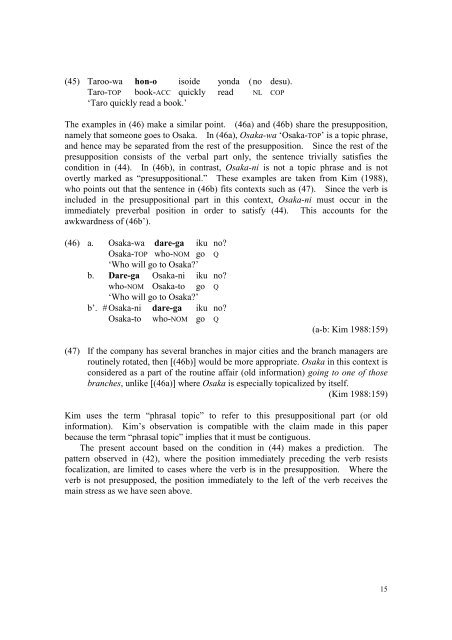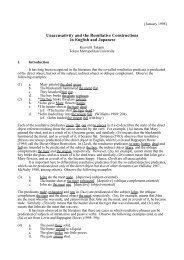Presuppositional Effects of Scrambling Reconsidered*
Presuppositional Effects of Scrambling Reconsidered*
Presuppositional Effects of Scrambling Reconsidered*
Create successful ePaper yourself
Turn your PDF publications into a flip-book with our unique Google optimized e-Paper software.
(45) Taroo-wa hon-o isoide yonda ( no desu).<br />
Taro-TOP book-ACC quickly read NL COP<br />
‘Taro quickly read a book.’<br />
The examples in (46) make a similar point. (46a) and (46b) share the presupposition,<br />
namely that someone goes to Osaka. In (46a), Osaka-wa ‘Osaka-TOP’ is a topic phrase,<br />
and hence may be separated from the rest <strong>of</strong> the presupposition. Since the rest <strong>of</strong> the<br />
presupposition consists <strong>of</strong> the verbal part only, the sentence trivially satisfies the<br />
condition in (44). In (46b), in contrast, Osaka-ni is not a topic phrase and is not<br />
overtly marked as “presuppositional.” These examples are taken from Kim (1988),<br />
who points out that the sentence in (46b) fits contexts such as (47). Since the verb is<br />
included in the presuppositional part in this context, Osaka-ni must occur in the<br />
immediately preverbal position in order to satisfy (44). This accounts for the<br />
awkwardness <strong>of</strong> (46b’).<br />
(46) a. Osaka-wa dare-ga iku no?<br />
Osaka-TOP who-NOM go Q<br />
‘Who will go to Osaka?’<br />
b. Dare-ga Osaka-ni iku no?<br />
who-NOM Osaka-to go Q<br />
‘Who will go to Osaka?’<br />
b’. # Osaka-ni dare-ga iku no?<br />
Osaka-to who-NOM go Q<br />
(a-b: Kim 1988:159)<br />
(47) If the company has several branches in major cities and the branch managers are<br />
routinely rotated, then [(46b)] would be more appropriate. Osaka in this context is<br />
considered as a part <strong>of</strong> the routine affair (old information) going to one <strong>of</strong> those<br />
branches, unlike [(46a)] where Osaka is especially topicalized by itself.<br />
(Kim 1988:159)<br />
Kim uses the term “phrasal topic” to refer to this presuppositional part (or old<br />
information). Kim’s observation is compatible with the claim made in this paper<br />
because the term “phrasal topic” implies that it must be contiguous.<br />
The present account based on the condition in (44) makes a prediction. The<br />
pattern observed in (42), where the position immediately preceding the verb resists<br />
focalization, are limited to cases where the verb is in the presupposition. Where the<br />
verb is not presupposed, the position immediately to the left <strong>of</strong> the verb receives the<br />
main stress as we have seen above.<br />
15



